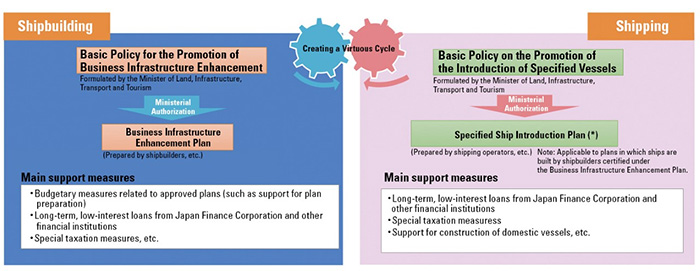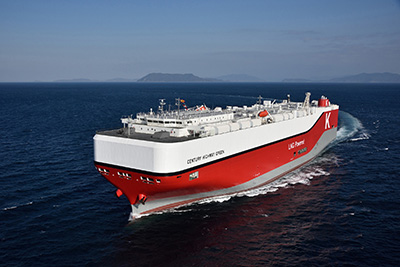Ocean Newsletter
No.511 November 20, 2021
-
Enactment of the Act on Strengthening Maritime Industries and Its Significance
OTSUBO Shinichiro
Former Director-General, Maritime Bureau, Ministry of Land, Infrastructure, Transport and Tourism / Visiting Research Fellow, Japan Transport and Tourism Research Institute / Advisor, Nippon Hakuyohin Kentei Kyokai(The Ship Equipment Inspection Society of Japan)For Japan, securing stable maritime transportation is indispensable for the survival of its society and economy, and is of a highly public nature. However, it is mainly a private-sector enterprise rather than a government-funded service, so effective policies cannot be carried out on the idea of "constructing public facilities using national funds." Here lies the difficulty of industrial policy. The Act on Strengthening Maritime Industries passed by the National Diet in 2021 was a system formulated as the best policy for the present time. -
Transition in Maritime Transport Control and Future Developments
SAMESHIMA Takuya
Instructor, Department of Maritime Police, Japan Coast Guard AcademyA new resolution was announced by IMO in December 2021, laying out the new Vessel Traffic Service (VTS) guideline. The new resolution represents a large change to past content, and we are just now approaching a transitional period in maritime transport control for ensuring the safety of vessel traffic. This article tracks transitions in how VTS has come to be understood and defined, as well as introduces the main changes in the guideline as it develops in the future. -
The Natural World Heritage Site Amami Trail
IWAMOTO Chizuru
Councilor, Amami World Natural Heritage Office, Nature Conservation Division, Environment and Forestry Affairs Department, Kagoshima Prefectural GovernmentIn July 2021, Amami-Oshima Island and Tokunoshima Island were at last designated as Natural World Heritage sites. In the Amami Island group where these two islands are located, there is a long-distance nature walking trail called the Amami Natural World Heritage Trail where one can stroll through and enjoy the nature and culture of eight inhabited islands.
Amami Trail is aiming for conservation of the natural environment, the preservation and the passing on of environmental culture, and revitalization of the community, while also going forward with plans for sustainable tourism.
Enactment of the Act on Strengthening Maritime Industries and Its Significance
[KEYWORDS] productivity improvements / business restructuring / labor practice reformOTSUBO Shinichiro
Former Director-General, Maritime Bureau, Ministry of Land, Infrastructure, Transport and Tourism / Visiting Research Fellow, Japan Transport and Tourism Research Institute / Advisor, Nippon Hakuyohin Kentei Kyokai(The Ship Equipment Inspection Society of Japan)
For Japan, securing stable maritime transportation is indispensable for the survival of its society and economy, and is of a highly public nature. However, it is mainly a private-sector enterprise rather than a government-funded service, so effective policies cannot be carried out on the idea of "constructing public facilities using national funds." Here lies the difficulty of industrial policy. The Act on Strengthening Maritime Industries passed by the National Diet in 2021 was a system formulated as the best policy for the present time.
A Compilation of Maritime Industry Policies
99.6% of Japan's trade is by sea. This exceptionally high ratio of maritime transportation usage is unavoidable; Japan has no natural resources, relies on other countries for food, is not connected by land to other nations, and essentials like oil and grain are too heavy to be transported by air.
Securing stable maritime transportation is the foundation of Japan's social and economic existence and is of great public importance. However, marine transportation is not a publicly-funded service. As the private sector provides both the hardware, namely ships, and the software, such as the operation of ships by supplying crews and other human resources, effective policies cannot be formulated based on the idea of " constructing public facilities using national funds." If shipping companies and shipbuilders do not have the strength to compete as companies in a united global market, they will not be able to maintain their product and service standards.
Japan must guide policies to meet social demands such as reducing greenhouse gas (GHG) emissions while maintaining and strengthening the foundations of industry so that shipping, shipbuilding, and shipping crews can grow together and support the Japanese economy. In response to this need, the Act on Strengthening Maritime Industries (hereinafter the "Act") was passed unanimously by an ordinary Diet session this year and promulgated on May 21, 2021. It is the culmination of past policy efforts to address this theme. The Act is intended to strengthen the competitiveness of the shipbuilding and marine transportation sectors, reform work styles for crews, and improve productivity in coastal shipping. It is officially called the "Law for Partial Amendment of the Maritime Transportation Law and Others for Strengthening the Foundation of the Maritime Industry (Act No. 43 of 2021)." However, rather than being a new law, it is a so-called "bundled amendment" that collectively amends six existing acts: Marine Transportation Law, Shipbuilding Law, Coastal Shipping Law, Mariners Act, Seafarer's Employment Security Act, and Ship Safety Law.
Challenges in the Maritime Industry and the Aims of the Act on Strengthening Maritime Industries
In this section, I will outline the issues facing maritime transport, shipbuilding, and seafarers, along with the aims of this law.
International Shipping: Currently, companies are earning unprecedented profits due to the unexpected rise in container freight rates. In the long run, however, the ratio of cargo to/from Japan in the global cargo sector will decline due to the stagnant Japanese economy. Therefore, it must overcome international competition in new areas where Japanese shippers cannot be relied upon, such as cross transportation and ocean development. In addition, vessels with superior performance must be operated intelligently and utilize digital technologies.
Shipbuilding: Japan's relatively small-size shipbuilding industry has struggled in the face of competition from state-run Chinese shipyards and Korean shipyards that receive massive public support. These circumstances make the following strategies essential: 1. Responding to large-lot orders through joint design, sales, and construction by multiple companies; 2. Integrating production systems and operating multiple locations in a unified manner; 3. Responding to shipowners' needs in detail by installing cutting-edge technologies, improving on-site productivity, and developing and marketing zero-emission ships and autonomous vessels.
Coastal Shipping and Seafarers: While demand for transportation of essential commodities such as petroleum products and steel is declining due to Japan's shrinking population, most of Japan’s companies continue to be small or medium-sized, and industrial concentration is low. However, despite the average age of seafarers being greater than 50, new employees are on the increase, driving a decline in this average. In addition, more students from fishery high schools are now joining the industry, and joint projects by private-sector shipping companies are training younger seafarers who did not graduate from seafarer training institutions. Therefore, it is imperative to increase the retention rate of young people through actions such as improving working conditions.
Laws and Related Support Measures
One of the pillars of the Act is to promote investment in both the shipbuilding industry on the supply side and the shipping industry on the demand side, aiming to create a virtuous cycle (Figure 1). First, shipbuilders and other stakeholders develop plans for productivity improvements and business restructuring. These plans are then approved by the Minister of Land, Infrastructure, Transport and Tourism and supported by long-term low-interest loans and special taxation measures through the Japan Finance Corporation. Marine transportation operators and others then formulate plans for introducing high-quality ships ("specified ships") that are safe, have a low environmental impact, and reduce seafarer labor. The Minister of Land, Infrastructure, Transport and Tourism then approves these plans and provides long-term low-interest loans, special taxation measures, and, for domestic vessels, financial support through a special exception to the joint shipbuilding program of the Japan Railway Construction, Transport and Technology Agency.
Another pillar is reforming labor practices in coastal shipping. Employers of seafarers (shipowners) will be responsible for managing seafarer labor, which is currently left to the ship's captain. The employer shall appoint a person responsible for labor management, manage the working hours of seafarers under said person, and implement appropriate measures (such as early disembarkation from the ship) in accordance with the working hours.
Additionally, to improve trading environments and productivity in sectors such as coastal shipping, the government now requires written contracts (between shippers, operators, and shipowners). It will also establish a system of advisories and official declarations regarding shippers. Furthermore, a registration system for ship management services and a simplified ship inspection system utilizing remote monitoring of engines and other equipment will be established. The regulations also provide for the collection of reports from foreign corporations and other cruise operators as part of efforts to create an environment conducive to the resumption of cruises (which have been suspended due to the COVID-19 pandemic).
 ■ Figure 1
■ Figure 1
Industry Expectations
Despite some changes in recent years, Japanese shipbuilding and shipping companies have historically been highly interdependent. Even in a unified world market, connections to industries in ones' home country are essential. To create a virtuous cycle, shipbuilders must work together as partners from the concept stage, thereby supplying products that meet new shipping demands. Simply responding, "This is the only product we have," will not be sufficient.
However, shipbuilders also face staffing issues, so it is difficult to consider all aspects to meet demands from shipping companies. I hope that there will be an awareness of this constraint on the shipping side, with a view to working together with shipbuilders in the long run to refine the tools of their trade (including the vessels and the software that makes them run efficiently).
For coastal shipping, shippers and operators need to become more involved than ever in securing their own means of transportation (vessels and crew). The Act also introduces measures that increase shippers' and operators' responsibility towards labor practice reforms. However, I hope they will make voluntary changes as they are also under pressure to become carbon neutral. Shipowners are also urged to make further efforts, including the active use of ship management companies. (End)
 ■Figure 2: Car carrier fueled by LNG that emits less GHGs and air pollutants (courtesy of Kawasaki Kisen Kaisha, Ltd.) The Ministry of Land, Infrastructure, Transport and Tourism and the Ministry of the Environment supported its construction through a collaborative project. The new Act will increase the variety of financial support available for such advanced vessels in the future.
■Figure 2: Car carrier fueled by LNG that emits less GHGs and air pollutants (courtesy of Kawasaki Kisen Kaisha, Ltd.) The Ministry of Land, Infrastructure, Transport and Tourism and the Ministry of the Environment supported its construction through a collaborative project. The new Act will increase the variety of financial support available for such advanced vessels in the future.
